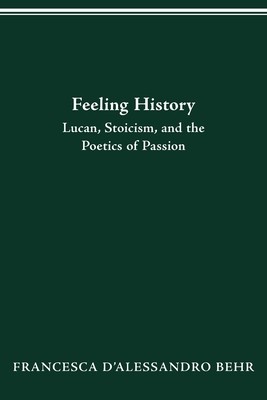
- We will send in 10–14 business days.
- Author: Francesca D'Alessandro Behr
- Publisher: Ohio State University Press
- ISBN-10: 0814257186
- ISBN-13: 9780814257180
- Format: 15.2 x 22.9 x 1.6 cm, softcover
- Language: English
- SAVE -10% with code: EXTRA
Reviews
Description
Feeling History is a study of apostrophe (i.e., the rhetorical device in which the narrator talks directly to his characters) in Lucan's Bellum Civile. Through the narrator's direct addresses, irony, and grotesque imagery, Lucan appears not as a nihilist, but as a character deeply concerned about ethics. The purpose of this book is to demonstrate how Lucan's style represents a criticism of the Roman approach to history, epic, ethics, and aesthetics. The book's chief interest lies in the ethical and moral stance that the poet-narrator takes toward his characters and his audience. To this end, Francesca D'Alessandro Behr studies the ways in which the narrator communicates ethical and moral judgments. Lucan's retelling of this central historical epic triggers in the mind of the reader questions about the validity of the Roman imperial project as a whole.An analysis of selected apostrophes from the Bellum Civile allows us to confront issues that are behind Lucan's disquieting imagery: how can we square the poet's Stoic perspectives with his poetically conveyed emotional urgency? Lucan's approach seems inspired by Aristotle, especially his Poetics, as much as by Stoic philosophy. In Lucan's aesthetic project, participation and alienation work as phases through which the narrator leads the reader to a desired understanding of his work of art. At the same time, the reader is confronted with the ends and limits of the aesthetic enterprise in general.
Lucan's long-acknowledged political engagement must therefore be connected to his philosophical and aesthetic stance. In the same way that Lucan is unable to break free from the Virgilian model, neither can he develop a defense of morality outside of the Stoic mold. His philosophy is not a crystal ball to read the future or a numbing drug imposing acceptance. The philosophical vision that Lucan finds intellectually and aesthetically compelling does not insulate his characters (and readers) from suffering, nor does it excuse them from wrongdoing. Rather, it obligates them to confront the responsibilities and limits of acting morally in a chaotic world.
EXTRA 10 % discount with code: EXTRA
The promotion ends in 20d.11:00:57
The discount code is valid when purchasing from 10 €. Discounts do not stack.
- Author: Francesca D'Alessandro Behr
- Publisher: Ohio State University Press
- ISBN-10: 0814257186
- ISBN-13: 9780814257180
- Format: 15.2 x 22.9 x 1.6 cm, softcover
- Language: English English
An analysis of selected apostrophes from the Bellum Civile allows us to confront issues that are behind Lucan's disquieting imagery: how can we square the poet's Stoic perspectives with his poetically conveyed emotional urgency? Lucan's approach seems inspired by Aristotle, especially his Poetics, as much as by Stoic philosophy. In Lucan's aesthetic project, participation and alienation work as phases through which the narrator leads the reader to a desired understanding of his work of art. At the same time, the reader is confronted with the ends and limits of the aesthetic enterprise in general.
Lucan's long-acknowledged political engagement must therefore be connected to his philosophical and aesthetic stance. In the same way that Lucan is unable to break free from the Virgilian model, neither can he develop a defense of morality outside of the Stoic mold. His philosophy is not a crystal ball to read the future or a numbing drug imposing acceptance. The philosophical vision that Lucan finds intellectually and aesthetically compelling does not insulate his characters (and readers) from suffering, nor does it excuse them from wrongdoing. Rather, it obligates them to confront the responsibilities and limits of acting morally in a chaotic world.


Reviews